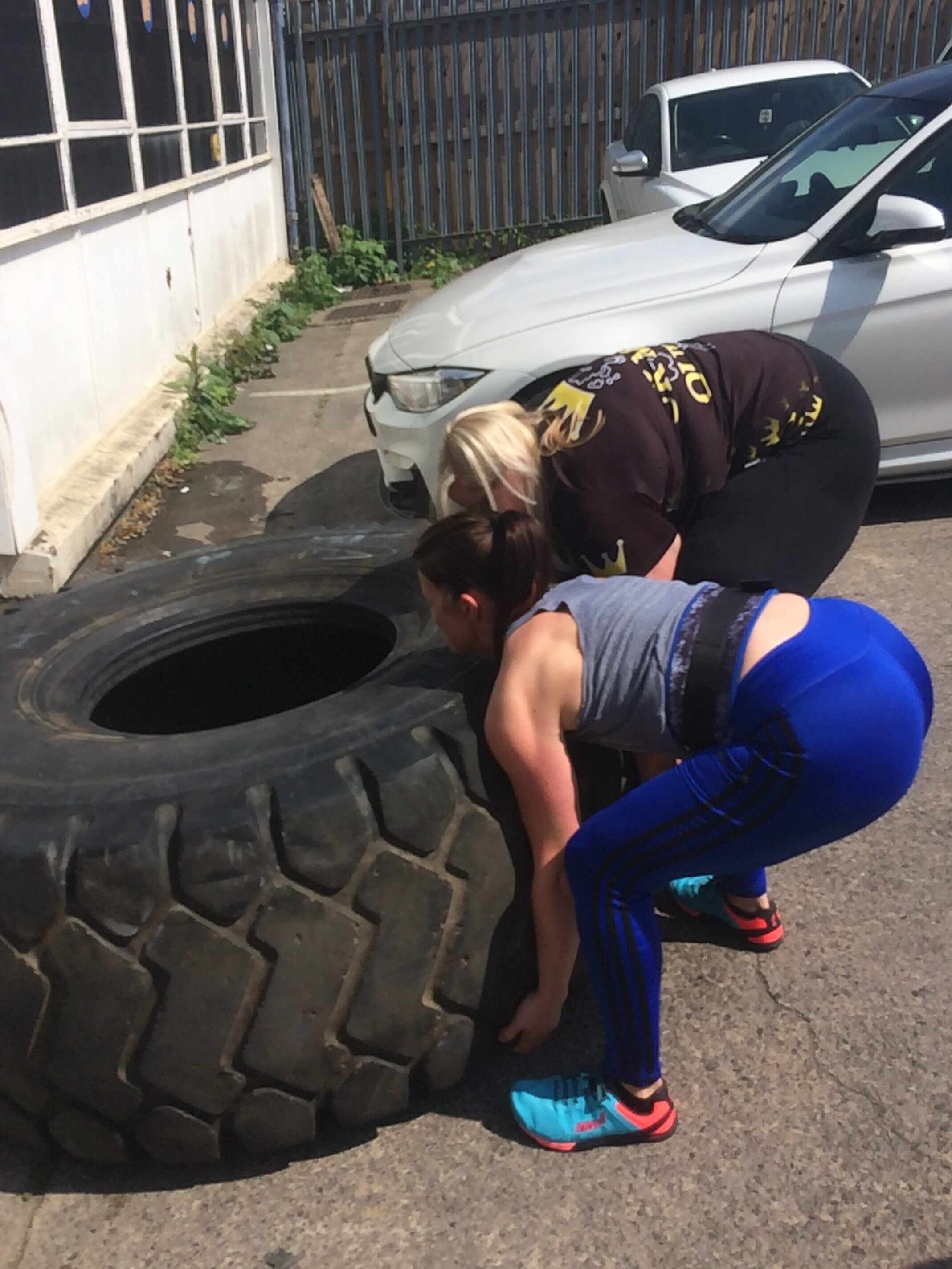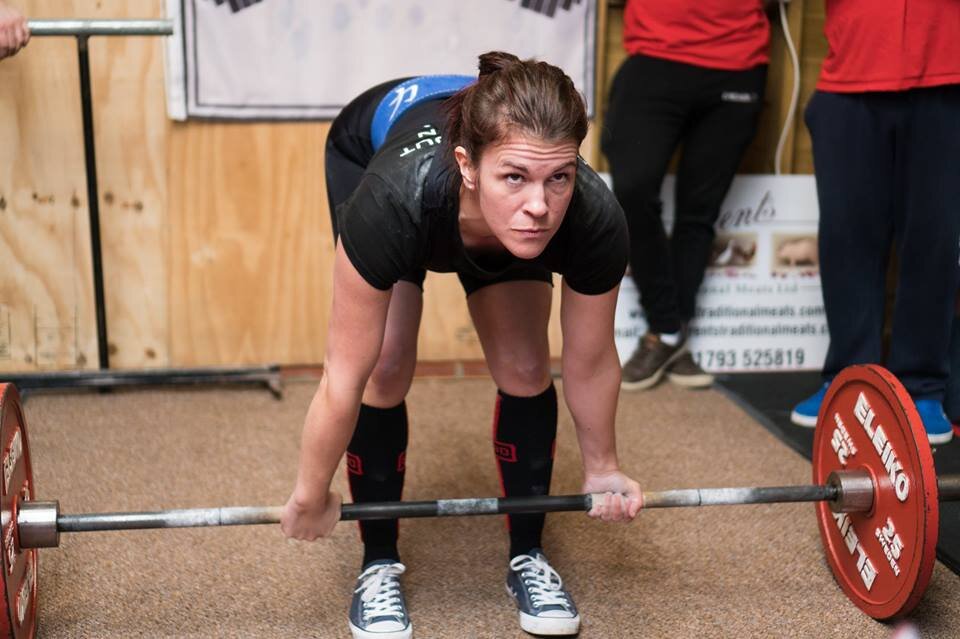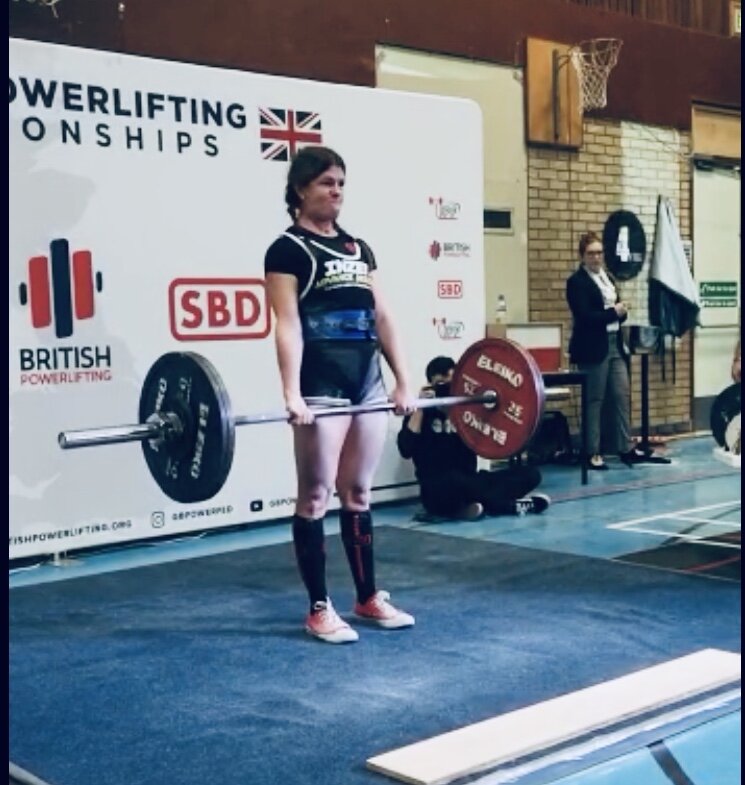How I somehow managed to end up at the British Masters Powerlifting Championships 2019
Running was my life.
I ran 3 times a week and entered races, I found babysitters for my children so I could make training sessions, I bought expensive shoes…
I also made sure I ran in the evening to avoid putting up with the inevitable migraine that came on after running, I painted my toenails black so they matched the now natural colour of at least 3 of them and I had a regular appointment with my sport therapy friend to fix my unending list of injuries.
Then something shifted and the cons outweighed the pros. I needed to find another sport to love.
I admired the strong and always wanted a really ‘toned’ body. Running may do many things but it does not give you a toned body - well not me anyway! As a sports therapist I also bang on about strength and conditioning all the time. It was time to walk the walk!
So I looked into getting some advice on weight lifting. I stumbled across a small private gym run by a woman who loved lifting. She gave me a crash course in the big 3 lifts (squat, bench and deadlift) and also tempted me with some Strongman stuff.
Now Strongman is bloody good fun. It’s lifting awkward stuff that you soon realise is just basically what you’ve been doing as a mum for the last 10 years. Farmers walks are just carrying the big shop in from the car and refusing to make 2 journeys. Sandbag carries is lifting a 4 year old dead weight that has fallen asleep in the car back to their bed. I even pulled a car and flipped 300kg tractor tyres.
As fun as it is, it is also very prone to injury. There are very few rules in Strongman. Get the weight up by any means. And that doesn’t work well when you rely on being fit to work!
So…the natural progression is powerlifting.
Now, I think it is good to point out here that most women assume that lifting heavy weights will make you look like a man!
Can I categorically say that having met some of Britains strongest women, IT WILL NOT!
In the same way that using 1kg weights at home WILL NOT give you a toned body.
Females do not grow muscle easily. Muscle is a very ‘expensive’ tissue. Female bodies have many other important tasks to complete. Growing muscle is low down on the list and will only do it if is forced to and expects to have lift very heavy weights on a regular basis. And even then there is a limit to what it can grow. If this were not true no females would take steroids to enhance muscle growth.
Back to powerlifting.
As a sport, powerlifting is very strict. There are LOTS of rules. I chose to join the IPF which appears to be the federation with the most rules.
I started by practicing lifting weights on my own. I knew the basics. But I also watched a lot of other lifters, in person and on YouTube to modify my own technique.
Sam with her coach Alexander Clarke
The next step was to get a coach. As I didn’t know where to start looking I asked a powerlifting friend and she gave me the details of her own coach who lived in Manchester. Remote coaching is very common in PL. It works well as everything can be videoed and regular catching up is easy. My coach is Alexander Clarke. He is one of the countries best powerlifters and his relaxed style of coaching means I can have a busy life without a coach being on my back if training has to be moved.
Next, I entered my first competition. This is like entering your first 10K. You don’t have to do it. But you want to test yourself.
I chose a small local competition as my first ‘gig’. And boy was I glad I did. They were kind to me!
One MAJOR difference from running. You have to make weight. You choose a weight category and you lift with other women who weigh what you weigh.
It makes sense because weight lifts weight. An 84kg woman will potentially be able to lift a lot more than a 42kg woman (although I have seen some very strong 42kg women!).
So, first you get weighed in. Probably the least glamorous experience aside from child birth, standing in my pants on some scales in the ladies toilet of a rugby club!
First ever powerlifting competition 2017
It is incredibly nerve wracking for some reason. Weight can fluctuate, scales can fluctuate and if you don’t make weight you can’t lift.
Anyway, once you make weight you get you kit checked. All kit must be IPF approved. Mine was not. I had the wrong knee sleeves and socks. Luckily AS I was a novice and not looking to use it as a qualifier they let me lift, just knowing that if I wanted to progress all this had to be changed.
So I got to lift.
You get 3 attempts at each lift. Squat. Bench. Deadlift.
The squat is first.
Now this is where it gets really fun. Unlike running where you can hide in the crowd. Apart from your family and friends who have come along to support you no one is really watching you run in a field of a few 100, maybe even 1000s.
Powerlifting is very different. First there are 3 referees. One front, two side. Watching your every move and looking for anything you do wrong. There are also at least 3 spotters on the platform with you. They are there to make sure you stay safe. All of these people do an amazing job. It must be exhausting keeping concentration for that long.
So, you stand on the platform with 6 pairs of eyes on you, a heavy weight pushing down on your back and wait for what seems like eternity for the ‘ SQUAT’ command. You must make depth and you must not re-rack the weight before you are given the command.
Well I got 50% of this right. I’d re-racked before I’d barely stood up. Making it a ‘No Lift’.
But I got another 2 chances to lift and managed it on the second lift. I then got my 3rd lift and felt invincible.
Once the initial lift is done, the nerves subside and the bench and deadlift were a much less stressful affair. I got them done and felt proud of myself.
I had the bug.
Divisional qualifier July 2019
The next competition I entered was a British Qualifier at Divisional level. Run in a very similar way, but with a higher standard of lifters. And more of them. Which meant the day went on way longer. By the time I got to deadlift I was ready for a nap and totally bombed lifting well under what I knew I could.
The following year I returned to the same qualifier. And this time I brought caffeine. And lots of it.
The IPF is a drug tested federation, but caffeine is allowed up to a point. Under the supervision of my coach I had 8 espressos over the course of the competition. It worked like a charm. I had an incredible day of lifting.
Went home on a high. And of course, went on Google looking for the next competition.
I noticed that the next competition was the British Masters Championship. I just qualified as a Masters 1 lifter last year at the ripe old age of 40. So, looked at the qualifying totals. I met the criteria!
I entered and got accepted that same night.
So, instead of a nice easy summer I got back to training, this time leaving nothing on the table. I trained really hard.
I train a lot in the RPE (rate of perceived exertion) range. Which requires you to be truly honest with yourself. I always use the ‘If someone held a gun to your head - could you do one more rep’ technique. It just helps push yourself that little extra. Our brains are very good at protecting us from danger and as such I always feel I go too easy on myself.
The training went so well and 3 weeks out I was getting personal bests every time I went in the gym.
Then, I got a cough. Which became a chest infection. Again under the supervision of my coach, I carried on training. I rested when I could. But actually things were going ok.
Until a particularly ferocious coughing fit left me with a bruised rib and costachondritis, the Wednesday before the comp on the Saturday.
Well, I was gutted. Even breathing was agony. Luckily I had finished my training but it meant I couldn’t test if I could even lift with a bruised rib.
After days of procrastination I decided I had to give it a go. It was the British Masters Championships.
So with NSAIDs and a good will I gave it a go.
I travelled up the night before scales in tow so I could check if I could eat breakfast before weigh in.
I slept well and woke feeling confident.
Weighing 61.3kg on my scales I ate 1egg and half a bagel feeling sure I would still make the 63kg category.
Got to the venue and met some of the other competitors who you soon realise are just as anxious as you. Talking to them I also realised I was in some spectacular company. A few had done World Championships before and one girl was just 5 weeks from doing the Arnolds (as in Schwarzenegger!).
Anyway, weight was fine, kit check raised a t-shirt issue meaning I had to buy a new one there. But I started the fuelling process and soon it was time to warm up. Now was the moment of truth - would I even be able to stand weight on my back?
As it was it felt fine, no issues. In fact it felt great.
Time to squat - called to the platform by the commentator…I started at a conservative 102.5kg. I knew I could rep that weight. I got 3 white lights - good Lift.
Second and third attempt both went well and I finished with a PB 117.5kg.
Time for bench. Didn’t feel so good warming up, the ribs come in to play a bit more with bench press and I was worried but I got my first attempt of 55kg. Sitting up from the lift I felt my ribs screaming.
I failed the next 2 bench attempts.
Final lift of the British Masters Championships 2019
Deadlift time. Having been in pain for days and now feeling it even more from the benching incident I was feeling very tired. I took my caffeine to try to bring me back to life - but I knew it had just been a long week.
My first attempt of 115kg which I was repping 2 weeks previously only just made it up.
I revised my second attempt to 120kg. But failed it. I was exhausted and deflated.
My coach who was with me came to talk to me. ‘You’ve got this. You got it off the ground which means you can lift it. Just don’t stop trying. Keep going’.
So I did.
I got the 120kg and walked away with a 292.5kg total.
I didn’t win. Not even close. But I competed at national level in a sport I adore.
Is this the end of my powerlifting journey?
You’re kidding, right?.





